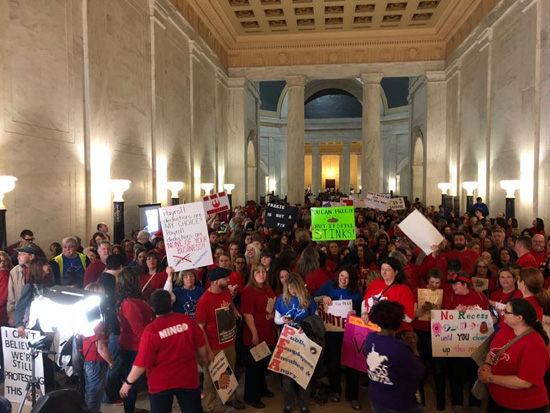Teachers Get 5% After Strike; Victory for Cops, Too!

West Virginia teachers hung tough and it paid off. Photo courtesy American Federation of Teachers
Teachers, cops, firefighters and everyone else who works for state and local governments across the country had a huge victory when the state of West Virginia agreed to give its teachers a 5% raise. The teachers, who had mounted a two week strike over pay, were ecstatic.
While cops are forbidden by law to strike, the outcome here should be encouraging for law enforcement people who have watched their real wages decline, their health care costs go up and their pensions threatened. There is real hope now that some of these trends can be reversed with an aggressive protest. It’s clear that there are many citizens who want to support their teachers, police, and all the other public employees who work to make the community a better place.
The West Virginia statewide teachers’ strike — one of the biggest in the nation in years — could signal the beginning of a revolt among all public employees who have had enough of the increased costs of health care, working without a raise for years, theft of pensions, and understaffing.
The nine-day walkout was highly unusual. According to an in-depth report on the strike in The New York Times by labor reporter Steven Greenhouse, teachers don’t leave their classrooms unless they’re seriously fed up, and West Virginia’s teachers were mad as hell.
Greenhouse writes, “Austerity policies have squeezed them more and more each year: They earned, on average, $45,622 in 2016, with West Virginia ranking 48th among the states in teacher salaries, according to the National Education Association. Only Oklahoma and Mississippi paid less, and Oklahoma teachers, encouraged by the West Virginia walkout, are also considering a strike.
“West Virginia’s 20,000 public schoolteachers have not received an across-the-board raise since 2014. Early this year, West Virginia’s Republican governor, Jim Justice, offered them a 1 percent a year raise for the next five years, but if inflation averages 2 percent a year for that period, this translates into an effective 5 percent pay cut.
Lawmakers defended the 1 percent raises as fiscally responsible, but teachers saw them as an affront. Adding to the pain, West Virginia told its school employees that many of them would have to start paying $300 more a month in health care premiums. The strike ended only after the governor signed a bill giving them a 5 percent raise effective July 1 — so instead of getting 1 percent a year, they get 5 percent this year.
“West Virginia’s teachers were like the proverbial frog in water that was slowly being brought to a boil. But this frog realized what was happening and jumped. Moreover, state officials added insult to financial injury. When teachers from a few counties held protests in early February, Governor Justice belittled them, calling them “dumb bunnies.” Then the state health plan told teachers that if they didn’t download and use a “wellness app,” Go365, to track their steps, they would be penalized $500 a year.
Among those on strike was Rebecca Diamond, a second grade teacher in Wayne County, who earns just $39,000 a year after 19 years on the job. She told HuffPost that she works as a cashier at Hardee’s on weekends, for $8.75 an hour, to help support her family. When she started teaching, she knew that it wouldn’t make her rich, she said, “but I thought it would be enough.”
“Teachers say these budget cuts and tax cuts have hurt them, along with the quality of education. West Virginia has more than 700 unfilled teaching positions, as teachers head to jobs in neighboring Virginia, Ohio and Pennsylvania that pay far more. Instead of raising pay to attract qualified applicants, West Virginia officials want to reduce certification standards.”
Sound familiar? Across the country the law enforcement profession is suffering the same sort of crisis. Underfunding, no raises and increased health insurance premiums, efforts to eliminate defined pension benefits, and low staffing levels that have reached a crisis point, have caused many to leave the job. Recruitment is a problem too. Who is going to take on a career in the most risky difficult job out there without the promise of a good pay check, health care coverage and a pension?
And as Steven Greenhouse points out, “All this is happening as the Supreme Court weighs a case in which the conservative majority is expected to rule that requiring government employees to pay union fees violates their First Amendment rights. That decision is likely to weaken unions by reducing their membership and income. And if public-sector unions grow weaker and less effective in winning adequate raises, then teachers and other public servants might get so fed up that, as in West Virginia, they go on strike en masse.”














